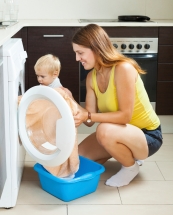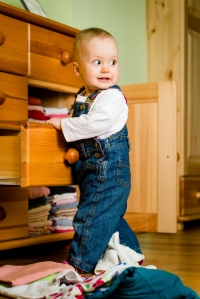 While play is extremely important, providing opportunities to engage in “work” is just as crucial to children’s development. Toddlers and preschoolers love to imitate adults at work and enjoy being helpful. This is the perfect age to teach children how to help with everyday chores. Household tasks offer numerous developmental opportunities for children to learn and grow. Use these 7 tips to get your children on the right track:
While play is extremely important, providing opportunities to engage in “work” is just as crucial to children’s development. Toddlers and preschoolers love to imitate adults at work and enjoy being helpful. This is the perfect age to teach children how to help with everyday chores. Household tasks offer numerous developmental opportunities for children to learn and grow. Use these 7 tips to get your children on the right track:
- Choose developmentally appropriate tasks that are safe and offer a high probability of success. Children at this age should not be handling hot water, toxic chemicals, animal or human waste, or cumbersome equipment. In addition, offer child-size tools whenever possible.
- Start small with tasks divided into manageable steps. “Clean your room” is too broad for toddlers or preschool age children. Try specific directions: “Put the blocks in the bin,” or “Put the books on the shelf.”

- Take time to teach children how to complete a task before expecting them to do it on their own. In addition to specific, simple, step-by-step directions, young children need numerous opportunities to practice. They will also need your guidance, so be sure to stay close by. Young children get distracted very easily. They will need you near to motivate them and praise their efforts, as well as ensure their safety.
- Make it fun and model an enthusiastic attitude. Focus on finishing and help children see satisfaction in a job well done. “When we are done, the table will be clean, and we can go play outside!”
- Encourage and reinforce children’s efforts and remember to thank them. Avoid redoing tasks children complete – they quickly realize when this happens that they are not doing “real” work and that their efforts are not valued.
- Wait until children are about to attempt the chore again to correct past mistakes. For example, if you noticed that the food your child scraped off his plate landed beside the garbage during his last attempt, remind him right before his next attempt to hold his plate over the garbage.

- Do not expect perfection. Your expectations will likely be higher than children’s abilities will allow. Always keep in mind that you are doing what is best for children by allowing and encouraging them to help. Research shows it is one of the best ways to teach responsibility and build self-esteem. Take heart in knowing that children’s skills improve quickly with practice!
Remember, the time you spend teaching children household tasks is an investment in the future. Chores do take longer when you are having young children help, but children will be more likely to help out when they are older if participation was encouraged when they were young. In addition, children learn important life skills when they are taught how to do chores: organization, following directions, problem solving, health and safety, and team work. The value of the investment is unmeasurable!
Back to blog listing